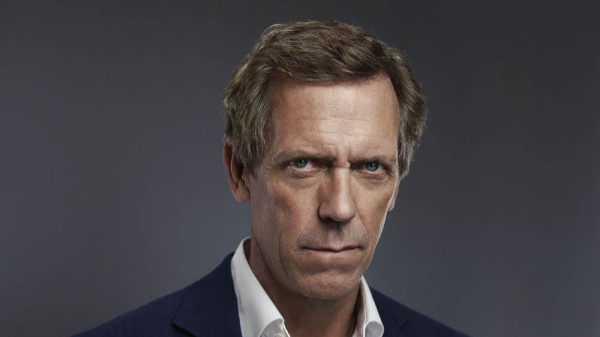Hugh Laurie (House) stars as Richard Roper in BBC One’s new six-part adaptation of John le Carré’s 1993 espionage novel, The Night Manager.
Adapted by acclaimed writer David Farr (Hanna), the first television adaptation of a le Carré novel in more than 20 years brings together love, loss and revenge in a complex story of modern criminality.
The Night Manager is currently airing at 9pm on Sunday nights on BBC One.
Richard Roper is well-born, well-educated, has grace and has charm. But behind the public mask – billionaire businessman, entrepreneur, philanthropist, gentleman – lurks a Mephistopheles.
The worst man in the world has built an empire from his trade in human life, selling arms to the highest bidder and purchasing whatever souls he can along the way. When Pine saves his son – his love for him, Roper’s only weakness – Roper welcomes him into his family. Which may just prove his undoing.
How long ago did you get involved with The Night Manager and what was it that attracted you to the story in the first place?
“I fell in love with the book when I first read it back in 1993. I’d worshipped le Carré since I was a teenager – not an unusual thing, obviously – and was completely enthralled by the romance of the secret struggle, the friction between the inner and outer worlds. But this story in particular I found endessly intriguing, mythic almost.
“I’ve absolutely no skill or instinct for producing, but this was the only time in my life I’ve ever tried to option a book. As I remember it, I tried to get the rights before I’d finished the third chapter. I was unsuccessful, of course – the great Sydney Pollack had jumped on it and wouldn’t let go – but the character of Pine (and yes, back in 1993 I impudently imagined myself playing Pine…) is a fascinating one: the errant knight roaming the landscape, looking for a cause, a flag to fight for. Better still, to die for. I thought it was such a beautiful story.
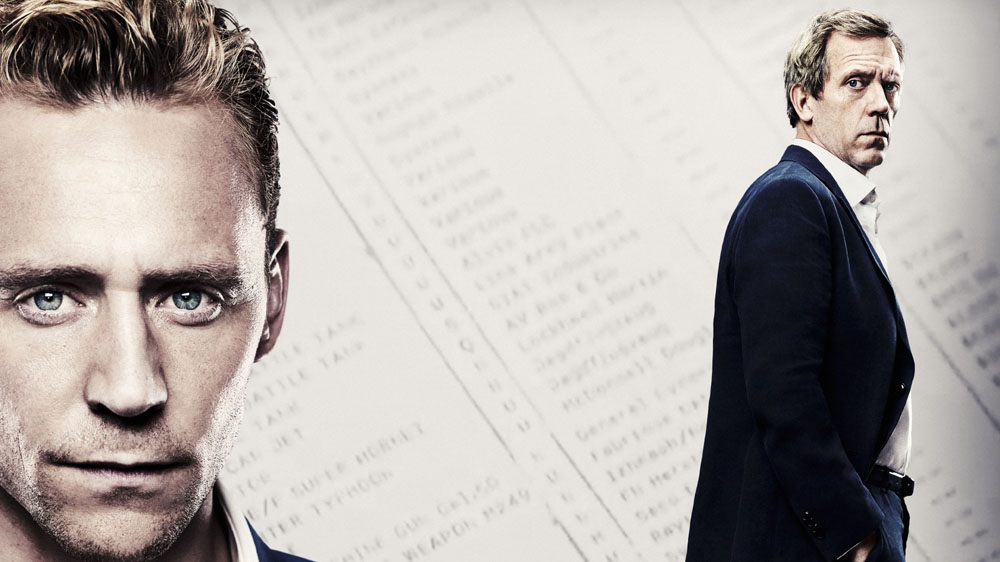
“Having said all that, I can’t claim any credit for getting the thing off the ground. I just told the producers that I would be happy to take any job on the production, as actor, caterer, anything I could do to make it go – I just wanted to be involved with it.”
This is a contemporary adaptation of the novel. How does that change the story and fit in with our world right now?
“I suppose it’s a characteristic of myths, that they’re in some sense eternal. Stories that can stand to be told and retold at any time, in any setting. Usually I would say that trying to make things contemporary is a mug’s game, because events will always overtake you.
“The original story involved an arms dealer – Richard Roper, played by your humble servant – selling weapons to the Colombian drug cartels. And perhaps the cartels seemed less ‘relevant’ these days. But a couple of months ago, while we were filming, a Mexican military helicopter was shot down with a surface-to-air missile and the Mexican government essentially admitted they were at war with the cartels, and had no idea where their weapons were coming from. So there you go: le Carré writes it, and 20 years later, it happens.
“But in any case, we have transplanted the story, beginning in Cairo with the Arab Spring of 2010 (another event, by the way, that no one saw coming – for all the CIA satellites circling over our head, no news organization, no intelligence agency predicted it) and moving to the present day.
“David Farr, the writer, has done an incredible job of reinventing the last third of the story to accommodate a different continent and a very different kind of conspiracy. I hope that we have been able to give it a sort of contemporary freshness, while retaining something of that mythic quality.”
This is an epic production. Can you talk a little bit about the locations that were visited?
“You see, this is why people hate actors – one of the reasons, anyway – because there is no reason why I should get to sit in a beautiful place like this. None. Undeserved. We began in Switzerland, which is the setting for the quiet hotel implied by the title.

“It’s quite something to open your bedroom window and see the Matterhorn staring down at you. A metaphor for the heights we were trying to scale. About a third of the story takes place in London, which is a metaphor for London. I wasn’t actually involved in that part, but I went along anyway, just to eat the sandwiches.
“We then spent six weeks in Morocco, and have been here in Mallorca for five weeks. Not a day has gone by without a member of the cast saying, “I can’t believe that I am actually here doing this.” It’s our good fortune to be playing characters who live a very luxurious, jet-setty life and that means, in order to do it, we have to live it. It’s hard, it’s gruelling…”
The director on this project is Susanne Bier who is an Academy Award-winner. What does she bring to The Night Manager?
“Everything. She is The Night Manager. Her vision, her taste, her approach has defined every part of what we are doing, and it’s been an absolute thrill to be a part of. Not to say she and I always agree, because we don’t – in fact the first time we met, one of the very few things we agreed on was that we would constantly disagree.
“But it’s wonderful to be in the hands of a director with such taste and wit, such an eye for detail but also for the grand scope of the story – it encompasses a large period of time, several continents, a huge cast of characters and yet at the same time it needs to be very detailed.
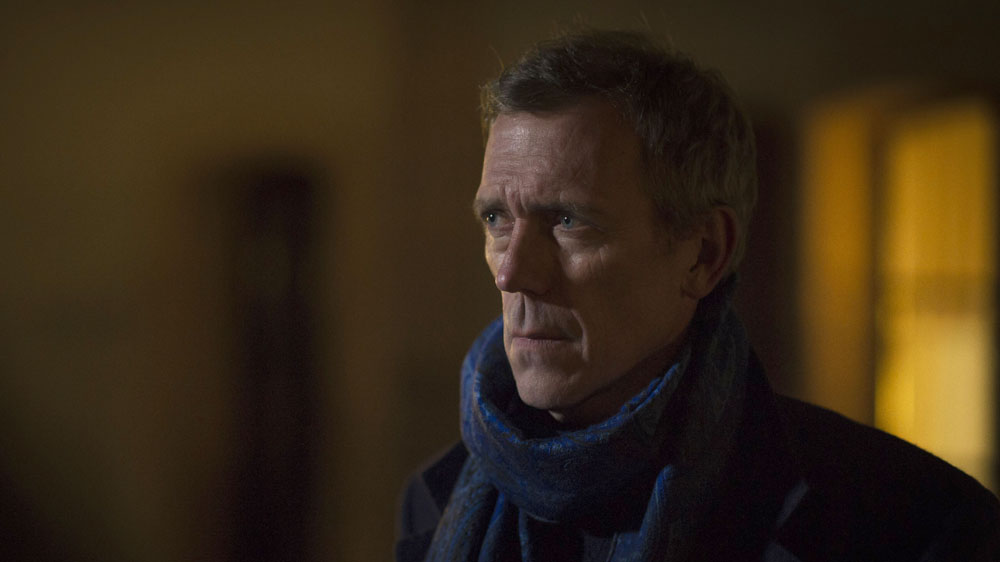
“I hope le Carré won’t mind me saying this, but he writes thoughts more than deeds – obviously harder to render on film. He doesn’t tend to do car chases and things blowing up (although we have our fair share of that), but, for the most part, the story is detailed, psychological.
“It requires a director with a very specific set of skills and I can’t think of anyone else who could have done it with such elegance, such panache – or anyone else I would have rather done it with, to be honest. It has been an absolute delight, start to finish.”
At the heart of the story is the dynamic between Roper and Pine – can you talk about that dynamic and the dynamic between you and Tom as actors?
“You’ve used the word dynamic there, I can’t help noticing. Hmm, let me see. The character of Pine is a lost soul – I suppose that’s one of the things I responded to when I first read the novel and kept on responding to whenever I’ve read it since.

“He is noble, courageous, decent, but also lost. He is looking for a purpose, and decides that he will risk his life to take on an enemy who is described to him by a lover as “the worst man in the world” – that is Roper’s legend, and that’s what I’ve got to try and inhabit. But it’s an ambiguous story in as much as Pine’s original goal is to bring down this monster, but at the same time resist the monster’s charm. The Siren voice, the Medusa gaze, choose your mythic power. Because Roper gives his monstrosity and the evil things he does a kind of logic, even a glamour.
“There are moments when Pine teeters on the brink of the dark side, when you wonder which way he will go. At the same time you might wonder whether Roper is teetering too – that somewhere inside himself he wants to be caught, to be betrayed.
“The audience has to judge for themselves where Pine and Roper come close to crossing the line in opposite directions – where Roper might plunge the dagger into his own chest and where Pine might become the very thing he set out to destroy. It’s an absolutely fascinating exploration, and I think this about so much of le Carré’s writing. Some describe him as a spy writer, but his stories so far transcend the notion of genre; he uses the world of the spy and the intelligence business to examine some profound questions. My God, I hope we can do it justice.”
When Roper meets Pine in Switzerland, something about him seems to attract him and interest him right away – what do you think that is?
“How could anyone not be attracted to Tom Hiddleston? The question makes no sense. I think Roper, for all his villainy and monstrous conspiring, is looking for a kind of aesthetic. He seeks an experience far beyond simply making money – a companion with whom he can share his pleasure and triumph, the journey of it all, the adventure – and I think in Pine he identifies an equal. Or maybe a version of himself.
“At least, he sees someone to whom he can bequeath his empire. Roper does actually have a young son, played by the fantastic Noah Jupe (watch out for that name!) who is perhaps too gentle a soul to follow in his father’s footsteps.
“Roper is looking for someone to share the pleasures of his villainy. And even if Pine isn’t villainous, at least he is adrift – the devil is always looking for souls who aren’t anchored after all – and Pine is definitely not anchored at the beginning of the story. And maybe Roper sees a way of exploiting that, not just for his own mechanical purposes but also for the fun of it.
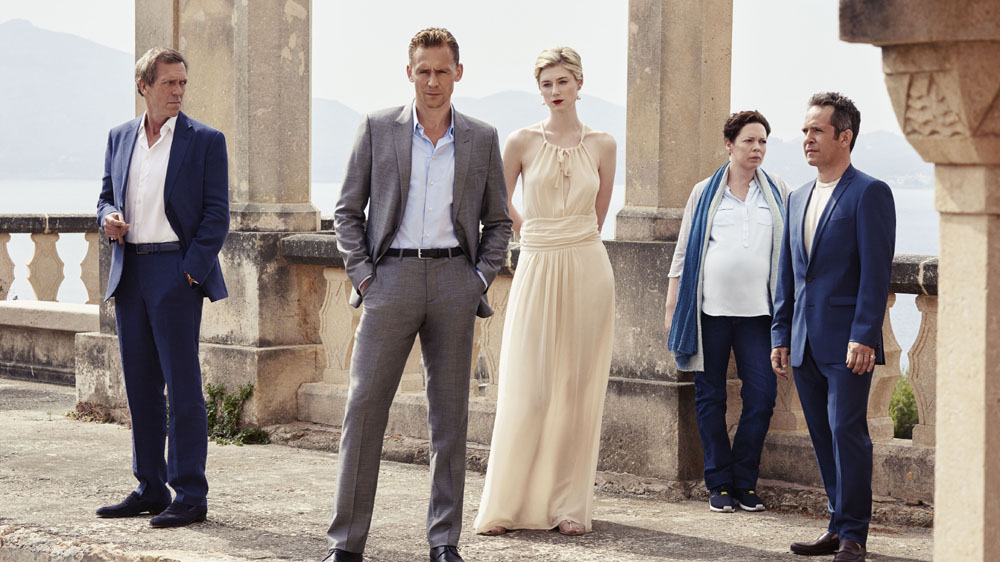
“I think he enjoys Pine’s company, his attitude, his whole affect. I imagine Roper picks the people around him very carefully, and in his mind has assembled a sort of royal court. He has a joker, a warrior, a poet, he wants the various seats around his royal table to be filled, and in Pine he sees a fitting and appropriate character who can flesh out his court.”
One final question about Roper and Jed – you mentioned their relationship, and that he has worked very hard to keep her separated from his business and that gets increasingly hard as the story goes along.
“That’s right. I mean Jed is half Roper’s age – good Lord that’s a surprising and unusual thing that you don’t expect to see in the modern world isn’t it? Well yes, it seems to be in the make-up of wealthy and successful men – they seem to gather about themselves young and beautiful women, and one imagines that Roper has a pretty salty past in that regard. But he and Jed have been together for a number of years when we join the story.
“I think they are close, that there is a genuine affection between them, but it might be that Roper actually needs her to remain an innocent – that making her complicit in his actions would tarnish the very thing he wants to keep separate.
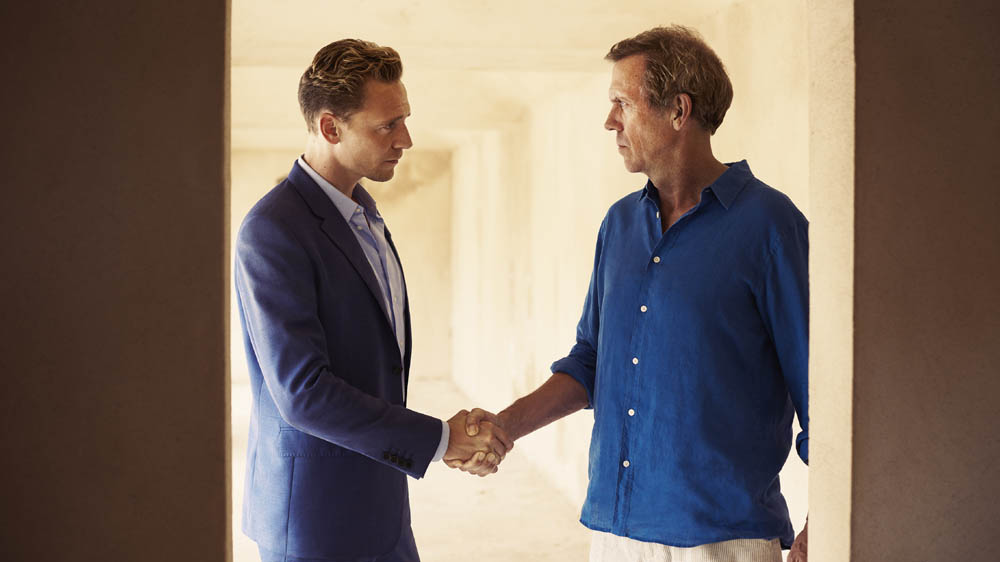
“Maybe at some level he sees Jed as having some sort of redemptive power precisely because she is not involved. He can have a purer, gentler relationship with her because her hands are not bloodied by the terrible things he has done – or maybe her innocence is another nutrient that he can feast on. I don’t know, and perhaps he doesn’t either. I ought to know by now, as we are only three days from finishing filming… but so many of the questions in this story are not easily answerable and one can look at them in so many different ways.
“The complexity is what makes it so enjoyable.”
Are you enjoying The Night Manager? Let us know below…

